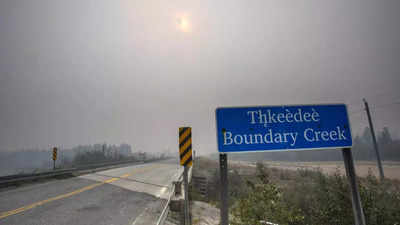Devastating Wildfires Force Mass Evacuation of Northwest Territories’ Capital City

Devastating Wildfires Force Mass Evacuation of Northwest Territories’ Capital City
In a heart-wrenching turn of events, the capital city of Canada‘s Northwest Territories has been plunged into chaos as a relentless onslaught of wildfires engulfs the region. Authorities have issued a dire evacuation order as hundreds of these voracious infernos continue to scorch the land, leaving destruction and despair in their wake.
The power and ferocity of these wildfires are unlike anything the region has witnessed before. As they rage across vast expanses of forested areas, the sky has transformed into a haze of smoke, casting an eerie and somber pallor over the landscape. Communities are facing an unprecedented crisis, struggling to grapple with the dual threats of the raging flames and the rapidly deteriorating air quality.
The decision to evacuate an entire capital city is a measure of last resort, indicative of the magnitude of the disaster unfolding in the Northwest Territories. Families, elderly residents, and individuals with varying abilities are now forced to abandon their homes, seeking refuge in crowded shelters or with friends and relatives in unaffected areas. The evacuation process itself is fraught with challenges, exacerbated by the urgency of the situation. Roads clogged with traffic, uncertainty about available accommodations, and the emotional toll of leaving behind one’s cherished belongings all contribute to the palpable atmosphere of distress.
Authorities are working tirelessly to manage the unfolding crisis. Firefighting crews from across the nation have been mobilized, battling the blazes with every resource at their disposal. Water-bombing aircraft are taking to the skies, dousing the fires with torrents of water in a desperate bid to stem their advance. Yet, even the most valiant efforts are often met with a merciless adversary as the wildfires continue to gain ground, their voracious appetite for destruction seemingly unquenchable.

The impact of these wildfires extends far beyond the physical devastation they leave in their wake. The mental and emotional toll on residents is immeasurable, as they grapple with the trauma of witnessing their homes and communities consumed by flames. The uncertainty of when they might return, what they might return to, and the toll this crisis will take on their future weighs heavily on their hearts and minds.
Local businesses, once bustling with activity, now stand shuttered and abandoned. The once vibrant streets are now silent, save for the distant roar of the fires and the occasional siren wailing in the distance. The economic implications of this disaster are vast and complex, with livelihoods in jeopardy and a long road to recovery ahead.
Climate scientists are sounding the alarm that these catastrophic wildfires are an ominous sign of the larger climate crisis facing our planet. Rising temperatures, prolonged droughts, and changing weather patterns create the ideal conditions for the ignition and rapid spread of these blazes. While the immediate priority is containing the fires and ensuring the safety of those affected, there is an urgent need for a broader conversation about the steps that must be taken to mitigate the impacts of climate change and prevent future disasters of this scale.

The resilience and strength of the affected communities shine through even in the face of such adversity. Neighbors are rallying together, offering support and solace to one another in their time of need. Relief efforts from neighboring regions and even international aid organizations are pouring in, providing essential supplies and a glimmer of hope amidst the darkness.
As the Northwest Territories’ capital city remains enveloped in smoke and uncertainty, the road to recovery will be long and arduous. Rebuilding lives, homes, and communities will require a collective effort that extends far beyond the borders of the affected region. The evacuation order serves as a stark reminder of the fragility of our existence in the face of natural forces beyond our control, and the imperative to take meaningful action to address the root causes of these crises.
In the midst of this catastrophe, the resilience, compassion, and unity on display remind us of the strength of the human spirit in times of adversity. As communities come together to support one another and begin the process of healing, they stand as a testament to the power of humanity to rise above even the darkest of circumstances.
Amidst the harrowing scenes of destruction and displacement, the valiant efforts of emergency responders and volunteers stand as a beacon of hope. Firefighters and first responders are working tirelessly around the clock, often putting their own safety at risk to protect lives and property. Their unwavering dedication in the face of danger showcases the remarkable bravery that emerges during times of crisis.

The impact of these wildfires on the region’s environment is equally concerning. Vast swathes of pristine wilderness have been transformed into charred landscapes, with ecosystems disrupted and wildlife habitats destroyed. The long-term ecological consequences are yet to be fully understood, but the urgency of conservation and restoration efforts cannot be overstated.
Amid the tragedy, stories of human resilience and compassion continue to emerge. Strangers reaching out to help one another, sharing whatever resources they can offer, and providing a comforting presence to those who have lost so much, paint a picture of a community united in the face of adversity. These acts of kindness serve as a powerful reminder that, even in the darkest of times, humanity’s capacity for empathy and solidarity can shine through.
Looking ahead, as the fires are eventually brought under control and the process of recovery begins, the lessons learned from this catastrophe must be woven into the fabric of future planning and policy-making. It’s a clarion call for greater investment in disaster preparedness, climate mitigation strategies, and community resilience initiatives. The collective efforts of governments, organizations, and individuals must be channeled toward a sustainable and safer future, where the devastating headlines of today serve as a turning point toward meaningful change.




